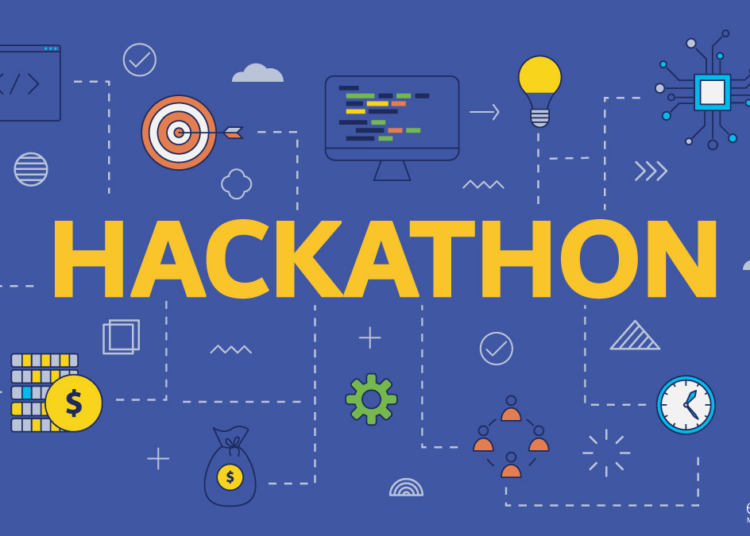Globally, hackathons are creating disruptive innovative technology for the startup industry, SMEs, and non-profit organisations.
The aim is to improve digital technology in solving societal issues to achieve global mobility in areas of technology-driven solutions and change the current narratives in the ecosystem.
Hackathon is an event where a group of coders gather, code, and design a project or an idea using technology to solve complex problems over a given duration of time. It is called coding, and coders often compete for a prize.
The project or idea so built is called ‘hack.’ The term hackathon was first coined on June 4, 1999, when a group of developers from around the world met in Calgary, Canada to develop the first IPv6 and IPSEC.
Over time, hackathons as a melting pot of creativity have become the nursery or incubation ground for the birth of many million-dollar startups and the development of innovative solutions for solving everyday societal problems.
Hackathons are also famous for their prestige and the crowds they attract.
While hackathons are not new per se, schools and corporate organisations in recent times have increasingly taken an interest in organising or supporting hackathons as part of their contributions to societal growth and development.
Universities, companies, and non-profits are hosting hackathon programmes to recruit top talent to solve problems to grow their business, or simply bring like minds together to code.
The idea is to provide a platform that enables innovators and startup founders with tech-driven or game-changing ideas and products to grow and scale their ventures.
This has informed the decision of a diverse group of tech innovators, problem solvers and creative thinkers to leverage this ingenious means to enhance skills and boost and improve productivity for aspiring startup brands and social entrepreneurs.
Stakeholders’ Views
According to Alexander Lobashev, Senior VP of Engineering, inDrive, hackathons are top ideas of world-leading tech startups who sought the need to provide tech innovative solutions for entrepreneurs, startups, and SMEs to enhance performance in critical sectors of the global economy while improving services of the corporate sector.
Lobashev opined that several startup brands owe their very existence to the creativity and technical expertise of software developers and coders who dream up, design, and build global products with reliable algorithms, and user-friendly interfaces.
He admitted that tech innovators would drive sustainability in corporate sectors through hackathons to drive more inclusive and collaborative engagements for ideas to emerge.
Aituaz Kola-Oladejo, executive director, Financial Service Innovators traced the history of financial inclusion hackathon in Nigeria to October 2021, stating that it will help to discover tech talents in tertiary institutions and change the current narrative in the nation’s digital ecosystem.
“The objectives of the ‘Financial Inclusion for All’ hackathon is to change the lifestyle of Nigerians from cash to cashless transactions, and to encourage seamless conduct of business via digital platforms,” she said.
Similarly, Olaolu Awojoodu, chief executive officer, Electronic Settlement Group, highlighted some of the challenges facing SMEs and start-up business in Nigeria to include lack of access to affordable technology, thus, accentuating the effectiveness of hackathons in providing the necessary technology for businesses.
Hackathons: Making Valuable Impact
Many popular startups and global brands were birthed at hackathons. Carousel, an app that simplifies buying and selling process, was developed during Startup Weekend Singapore, a hackathon event, in 2012. A few years later, the startup made a whopping $70-80m in Series C funding.
Around the world, famous hackathons have given birth to many iconic brands with huge associations among top brands. Hack Zurich, founded in 2014, is Europe’s largest and most-prestigious hackathon. It reportedly attracts over 55,000 applicants yearly, attracting support from Microsoft, Migros, Zurich Insurance, and Huawei, while 600 coders shortlisted from 85 different countries participate.
NASA’s International Space Apps Challenge is the world’s largest and best global hackathon founded in 2012. Held annually across over 320 locations for 48 hours, the goal of the hackathon is to address real-world problems about space and Earth using NASA’s free and open data.
In 2021, 28,000 participants from 162 countries and territories completed over 2,500 projects from 28 challenges at the 10th edition of the NASA Hackathon.
Elsewhere in Nigeria, in May 2023, a group of students gathered in Lagos and developed software solutions targeted at bridging the electricity supply gap in the country. Sub-Saharan Africa, including Nigeria, has the world’s lowest energy access rate with over half of its people unconnected to the existing national grids.
The Nigerian coders or software developers took part in the ‘Innovation Challenge’, a technology-based hackathon which challenged students on innovative solutions.
It was organised as part of this year’s annual energy event, ‘The Industry Discourse’ (TID) and fully supported by ENGIE Energy Access, a leading provider of alternative energy solutions in Africa.
To underscore the contribution of the budding developers, ENGIE Energy Access provided a financial reward of US$3,000 (N2.1m) for the winners of the Innovation Challenge, with the first team PERIHELION receiving $1,500; the second team TEMT Energy, $1,000, and the third-place team AGROLL, $500.
There’s no debate about the extent to which hackathons have impacted and are redefining the technology space. Part of the impact of technology is that the global language for change in today’s world is written in lines of code or programming, thus making hackathons one of the most-impacting tech trends of our time.
On her part, Onyiye Anene-Nzelu, head of Mini Grid, ENGIE Energy Access Nigeria, while emphasising the importance of the ‘Innovation Challenge’ hackathon to the Nigerian energy sector said that the outcome of the hackathon has the potential to drive software innovation, benefitting operational workflow and potentially saving time, cost and personnel power.
“Also, this enables us to identify and connect with exceptional minds passionate about energy transition and fostering talent discovery,” she added.
In Nigeria, the increasing awareness of the benefits of STEM (Science, Technology, Engineering, and Mathematics), has brought hackathons into the mainstream within the education and corporate sectors.
The growing community of coders has seen a sharp rise in notable hackathons held in Nigeria over the last five years. These include NaijaHacks, Re:Code Nigeria, Together Apart Nigeria, Hackaholics, Hack the Mara, Witty Tech Fiesta, FixPolitics, Women in Business Growth Lab, EnyexMono, and PVS Hackfest among others.
Indeed, among numerous benefits, hackathons have emerged as powerful platforms for solving many societal challenges by bringing together diverse groups of individuals with various skills and expertise. These intensive, time-bound events foster collaboration, innovation, and the rapid development of solutions. Here are some ways in which hackathons have a significant impact.
Collaboration and Diversity
Hackathons attract participants from different backgrounds, including programmers, designers, entrepreneurs, and subject matter experts. This diversity of skills and perspectives leads to cross-disciplinary collaboration, fostering the development of comprehensive solutions to complex challenges.
Rapid Problem-solving
Hackathons provide an environment conducive to rapid problem-solving. Participants work together intensively for a short period, typically 24-48 hours, encouraging quick thinking, creativity, and innovation. The time constraint often pushes teams to devise savvy solutions that might not have emerged through traditional approaches.
Innovation and Ideation
Hackathons encourage participants to think outside the box and come up with innovative solutions. The collaborative and competitive nature of these events fosters an atmosphere of experimentation, where participants can take risks and explore unconventional approaches. This often leads to the development of novel ideas and solutions.
Prototyping and Proof of Concept
During hackathons, teams focus on rapidly transforming their ideas into tangible solutions. This iterative process enables them to create proof-of-concept models or functional prototypes that can be tested, refined, and further developed after the event. The quick validation helps in showcasing the feasibility and potential impact of solutions.
Social Impact and Sustainable Development
Many hackathons focus specifically on addressing societal challenges, such as poverty, healthcare, education, climate change, and more. By aligning hackathons with social impact goals, participants are motivated to develop solutions that have a positive effect on communities and contribute to sustainable development.
Brand Networking and Collaboration
Hackathons often serve as catalysts for long-term collaborations. Participants connect with like-minded individuals, potential mentors, and industry experts during these events, leading to continued collaboration and the further development of ideas beyond the hackathon itself. These connections, however, can result in the launch of startups, non-profit initiatives, or ongoing projects aimed at addressing societal challenges.
Public Awareness and Engagement
Hackathons generate significant public attention, both during the event and afterward. They act as platforms for raising awareness about specific societal challenges and potential solutions. The increased visibility helps to engage a wider audience, including policymakers, organizations, and the public, on the ongoing discourse and encourages them to contribute to solving these challenges.





